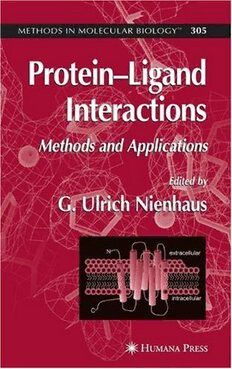Download Protein-Ligand Interactions: Methods and Applications PDF Free - Full Version
Download Protein-Ligand Interactions: Methods and Applications by Edwin A. Lewis, Kenneth P. Murphy (auth.), G. Ulrich Nienhaus (eds.) in PDF format completely FREE. No registration required, no payment needed. Get instant access to this valuable resource on PDFdrive.to!
About Protein-Ligand Interactions: Methods and Applications
Molecular recognition and binding of ligands (atoms, ions, and molecules) by proteins with high sensitivity and selectivity is of central importance to essentially all biomolecular processes and of key importance for the basic and applied sciences. In Protein-Ligand Interactions: Methods and Applications, leading experts with hands-on experience describe in detail a broad selection of established and emerging techniques for studying the interaction between proteins and ligands, including bulk biochemical techniques, structure analysis, spectroscopy, single-molecule studies, and theoretical/computational tools. Among the highlights are surface plasmon resonance (SPR) and reflectometric biosensor approaches, high-throughput screening with confocal optics microscopy, single molecule fluorescence and fluorescence correlation spectroscopy (FCS), atomic force microscopy (AFM), crystallography of reaction intermediates, and time-resolved X-ray crystallography. The protocols follow the successful Methods in Molecular Biology™ series format, each offering step-by-step laboratory instructions, an introduction outlining the principle behind the technique, lists of the necessary equipment and reagents, and tips on troubleshooting and avoiding known pitfalls. Cutting-edge and highly practical, Protein-Ligand Interactions: Methods and Applications offers novice and expert researchers alike a broad selection of powerful and widely applicable techniques that can be used to efficiently and successfully solve the task of characterizing protein-ligand interactions.
Detailed Information
| Author: | Edwin A. Lewis, Kenneth P. Murphy (auth.), G. Ulrich Nienhaus (eds.) |
|---|---|
| Publication Year: | 2005 |
| ISBN: | 1592599125 |
| Pages: | 537 |
| Language: | English |
| File Size: | 5.776 |
| Format: | |
| Price: | FREE |
Safe & Secure Download - No registration required
Why Choose PDFdrive for Your Free Protein-Ligand Interactions: Methods and Applications Download?
- 100% Free: No hidden fees or subscriptions required for one book every day.
- No Registration: Immediate access is available without creating accounts for one book every day.
- Safe and Secure: Clean downloads without malware or viruses
- Multiple Formats: PDF, MOBI, Mpub,... optimized for all devices
- Educational Resource: Supporting knowledge sharing and learning
Frequently Asked Questions
Is it really free to download Protein-Ligand Interactions: Methods and Applications PDF?
Yes, on https://PDFdrive.to you can download Protein-Ligand Interactions: Methods and Applications by Edwin A. Lewis, Kenneth P. Murphy (auth.), G. Ulrich Nienhaus (eds.) completely free. We don't require any payment, subscription, or registration to access this PDF file. For 3 books every day.
How can I read Protein-Ligand Interactions: Methods and Applications on my mobile device?
After downloading Protein-Ligand Interactions: Methods and Applications PDF, you can open it with any PDF reader app on your phone or tablet. We recommend using Adobe Acrobat Reader, Apple Books, or Google Play Books for the best reading experience.
Is this the full version of Protein-Ligand Interactions: Methods and Applications?
Yes, this is the complete PDF version of Protein-Ligand Interactions: Methods and Applications by Edwin A. Lewis, Kenneth P. Murphy (auth.), G. Ulrich Nienhaus (eds.). You will be able to read the entire content as in the printed version without missing any pages.
Is it legal to download Protein-Ligand Interactions: Methods and Applications PDF for free?
https://PDFdrive.to provides links to free educational resources available online. We do not store any files on our servers. Please be aware of copyright laws in your country before downloading.
The materials shared are intended for research, educational, and personal use in accordance with fair use principles.

